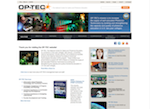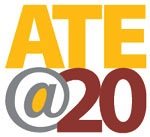
OP-TEC: National Center for Optics and Photonics Education
http://www.op-tec.org/
OP-TEC, the National Center for Optics and Photonics Education, an Advanced Technological Education (ATE) resource center, aims to "provide support through curriculum, instructional materials, assessment, faculty development, recruiting, and support for institutional reform." This site pulls together information about the program's partners, presentations and videos, as well as overviews and skills standards in photonics. Visitors will also find information about OP-TEC's upcoming events, and other professional development opportunities in optics and photonics.


